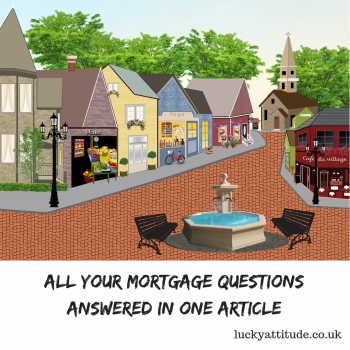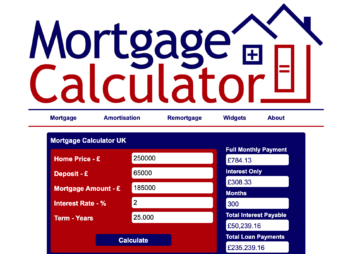All Your Mortgage Questions Answered

The annual median salary in the UK is £28,677, while the average house price is 8 times the salary – £226,906.
For an average person, it would take an incredibly long time to have enough cash to buy a house outright.
Therefore, for most of us in the UK, a mortgage is necessary to buy a home.
Buying a home is one of the biggest decisions you’ll ever make in your life, but the good thing is – the property that you’ll own will be passed down to family, so it’s a worthwhile investment.
What is a mortgage?
A mortgage is a loan that enables you to cover the cost of a home.
Buyers usually pay 10-20% of the house price upfront (known as a deposit) and take a mortgage loan on the remaining 80-90%.
The loan of 80-90% is secured against the value of your home until it’s paid off, meaning that your house isn’t actually yours until you’ve paid it off.
This means that if you’re struggling with paying back your mortgage, a lender can repossess (take back) your home and sell it to someone else.
… which is why taking out a mortgage you can actually afford to pay for 10-25 years straight, is so important, but more on that later …
What you should do before applying for a mortgage
Before applying for a mortgage, you need to save for a deposit.
You must have at least 10% of the house price saved in cash, but the more the better.
This is also a good time to ask around friends about good lenders and while you’re at it, shop around, check in with at least 2-3 lenders so you have an idea of what’s out there.
You may also want to find a selection of your favourite properties and view them, but it’s better to hold off putting in an offer until you have been pre-approved for a mortgage.
The reason for doing this is to avoid disappointment. Being prepared to make an offer and close a sale in a short period of time is very important for house sellers, so they will always prioritise buyers that are pre-approved by mortgage lenders.
To make your mortgage process easier here’s what you should do:
1. First, you must limit your credit card usage. Banks will check your credit card bills and whether you pay them on time.
2. Second, limit or avoid other forms of debt. If you have other loans such as car loans, business loans, personal loans, etc. You must avoid acquiring these before you apply for a mortgage.
3. Third, keep saving money and avoid overspending or buying things you don’t need. The bigger your bank savings, the bigger chance you get your loan approved.
4. And lastly, have a steady source of income and be employed/self-employed. If you’re employed, avoid job switching until you get your mortgage approved. Although if you are transferring to another job that has a better salary and benefits, you should transfer now because this will increase the chances of your mortgage approved.
How to apply for a mortgage, step-by-step
You can acquire a mortgage via banks or online comparison sites like msr – their Mortgage Servicing Ratio (MSR) Calculator is the tool that allows you to calculate how much of your gross income you can put towards a mortgage.
You can also try this super helpful mortgage calculator that caters specifically to the UK market. By filling in all the details, like your house price, deposit amount, interest rate, and the number of years you plan to pay your mortgage, you can clearly see the breakdown of total costs to be paid.
What’s more?
Mortgagecalculator.uk is also a thorough guide on everything a 1st-time buyer needs to know.
You’ll find information on interest rates, your borrowing power, and the impact of COVID-19 on the property market.
A mortgage loan is normally paid on a monthly basis. Most loans run for 25 years but the term can shorter or longer, depending on your agreement.
If you want to buy a home that costs £227,000 (as an example) and you have a 25-year mortgage. The average interest rate for a standard variable rate (more on this below) is 4.33%. So the total paid interest is £151,018 and the total amount repaid is £381,018 (house price £227,000+ interest £151,018).
Applying for a mortgage is a three-stage process:
Stage 1: Speak to a mortgage broker or a bank
Generally, the lender or mortgage broker will ask you a series of questions to work out what kind of mortgage you want, and how long you want it for.
They’ll also work out your financial situation.
This is generally used to provide an indication of how much a lender might be prepared to lend you.
They should also give you key information about the product, their service, and any fees or charges if applicable.
A good mortgage lender will go out of their way to make sure people don’t stretch themselves financially too much, but then there are the others who will do the opposite, so shop around.
PS! If you have a bad credit score (read more about credit scores and how to boost them here), you may still be able to get a mortgage. There are mortgage brokers who match you with bad credit mortgages. Avail Mortgage Brokers have great customer reviews on Trustpilot and they have been featured in trusted publications and national press, so we can recommend them.
Stage 2: Start your mortgage application process
The second stage is where the mortgage lender or bank will do some background checks about you.
They will do an “affordability assessment” and this is where you need to provide certain documents like ID, utility bills, payslips, bank statements of your current account/s, proof of benefits received, statement of 2-3 years accounts if you’re self-employed and tax returns.
Stage 3: Find a house and make a deposit
Once your mortgage application is approved, you can put in an offer for your favourite property and once it’s accepted, make a deposit.
The bigger deposit you pay, the smaller your interest rate.
For example, if the property that you want costs £200,000 and the deposit you’ll make is £20,000 which is 10% of the property. The remaining 90% is what is called LTV or “Loan to Value.”
LTV is the amount of your home that you own compared to the amount that is secured against a mortgage.
Calculating LTV is fairly simple; just take the amount you need to borrow, divide it by the value of the property and then multiply the result by 100 in order to get its percentage value.
Types of mortgage loans
Now that you know mortgage stages, requirements, and processes, let’s look at the different types of mortgage loans.
Once you decided how to pay the property and interests, you need to think about what mortgage type you’ll take.
There are two main mortgage types:
1. Fixed Rate Mortgage
Fixed-Rate Mortgage is a type of loan, where the interest rate you’re charged with stays the same for a certain amount of years, usually 2, 3, 5, or if you’re lucky – 10 years.
A fixed-rate is the most preferred option for people because you know exactly what you’re paying each month for a set period of time.
This gives you the advantage of helping you with your budget and peace of mind knowing that you’re in control of your savings and property.
However, fixed-rate deals are slightly higher than Variable Rate Mortgages. Also, once the interest falls, you won’t benefit from it.
2. Variable Rate Mortgage
Variable Rate Mortgages are the types of mortgages where the interest rate can change at any time.
When you chose this mortgage type, make sure you have some extra savings available so that you can afford the increased rate.
The advantage of choosing a variable rate is you can overpay and leave the deal any time you want. With Variable Rate Mortgage, it is usually easier and cheaper to switch loans if you find a better deal elsewhere.
Finally: Avoid these common first-time buyer mistakes
Buying a house or property is a life-changing decision, don’t make these 3 common mistakes:
1. Don’t buy a house based on emotion
2. Don’t only speak to one lender
3. Don’t sign documents you can’t understand
Good luck. (ask me anything, I bought my first property this year)






